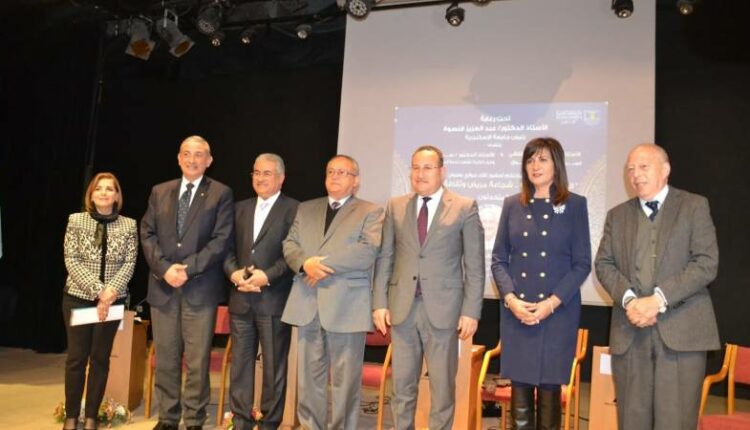Alexandria University President Attends Faculty of Law Dialogue Meeting on Mental Health
Professor Dr. Abdelaziz Konsowa, President of Alexandria University, witnessed this afternoon the dialogue meeting organized by the Faculty of Law within the framework of the activities of the university’s cultural season.
Among the meeting guest speakers were Dr. Nabila Makram, Former Minister of State for Immigration and Affairs of Egyptians Abroad, Founder and Chairman of the Board of Trustees of “Fahem” Foundation for Psychological Support, Dr. Abdelnasser Omar, Professor of Psychiatry and Managing Director of Al-Mashfa Hospital, and Dr. Nasser Loza, President of the International Federation of Mental Health, and Director of Behman Hospital in Helwan.
The meeting was attended by Dr. Ahmed Zayed, Director of the Bibliotheca Alexandrina, Dr. Mohamed El-Feki, Dean of the Faculty of Law, Bishop Pavli, Bishop of Youth, representing Pope Tawadros II, Pope of Alexandria and Patriarch of the See of St. Mark, Judge Saad El-Saadani, President of the Alexandria Judges Club, Judge Sadek Belal, President of the Economic Court in Alexandria, and Ambassador Mazeed bin Mohamed Al-Huwaishan, Consul of the Kingdom of Saudi Arabia in Alexandria, in addition to several members of the House of Representatives and the Senate, Dr. Mohamed Abdellah, the former president of Alexandria University, as well as deans and vice-deans of faculties, faculty staff members and students.
In his speech, Dr. Konsowa congratulated Ambassador Nabila Makram on the occasion of establishing the Fahem Foundation for Psychological Support, stressing the readiness of Alexandria University to cooperate through all its capabilities and cadres with the Foundation to spread the culture of mental health, raise awareness of the seriousness of mental illness, and providing support to mentally ill patients and their families through meeting their needs and treating them to reintegrate them into society. He emphasized the role of society in dealing with mental illness and considering it as a disease like other organic diseases and not considering it a source of embarrassment or stigma facing mental patients and their families. He also pointed out the role of the university in establishing a unit for psychological support within it, expanding it and developing its work mechanisms to provide psychological support and guidance to university students. Dr. Konsowa stressed the need for solidarity and solidarity and unity as a society to change the prevailing culture towards mental illness and not to reduce psychological problems and to provide support in all its forms to institutions that care about mental health, just like those that provide support to institutions that care about organic health.
Ambassador Nabila Makram expressed her pleasure to be cooperating with Alexandria University in spreading awareness of mental health, supporting mental patients and their families, providing ways to treat them, and combating discrimination and bullying against mental patients. She stressed that support for patients should be in society in general and at the university level in particular, due to the disorders students may be exposed to, and pressures resulting from the sudden change in the surrounding environment from the school stage to the university stage, the pressures of moving to other governorates for study, the academic challenges, and the inability to express pent-up feelings. She said that mental illness may lead to suicide attempts, and therefore the community must support, relieve pain, and provide the surrounding environment that understands the suffering of people with mental illness, and finds a solution to their problems. She referred to the role of the university in providing studies and research on psychological conditions in light of the changes that occurred in the Egyptian society.
Dr. Mohamed El-Feki, Dean of the Faculty of Law, emphasized the faculty’s keenness to perform its role in serving the community and meeting its needs by informing and educating its students in various fields, and spreading the culture of mental health because of its importance in helping those suffering from psychological problems and their families. He also pointed out the need to put mental illness in consideration when enacting laws.
Dr. Abdelnasser Omar stressed that all people are vulnerable to psychological problems, so it is necessary to understand mental illness and its symptoms and spread awareness among society about mental health and the suffering that mental patients and their families face.
Dr. Nasser Loza pointed out the importance of changing the culture of society towards mental illness, and the need to understand and respect the mental patients and protect their rights.

